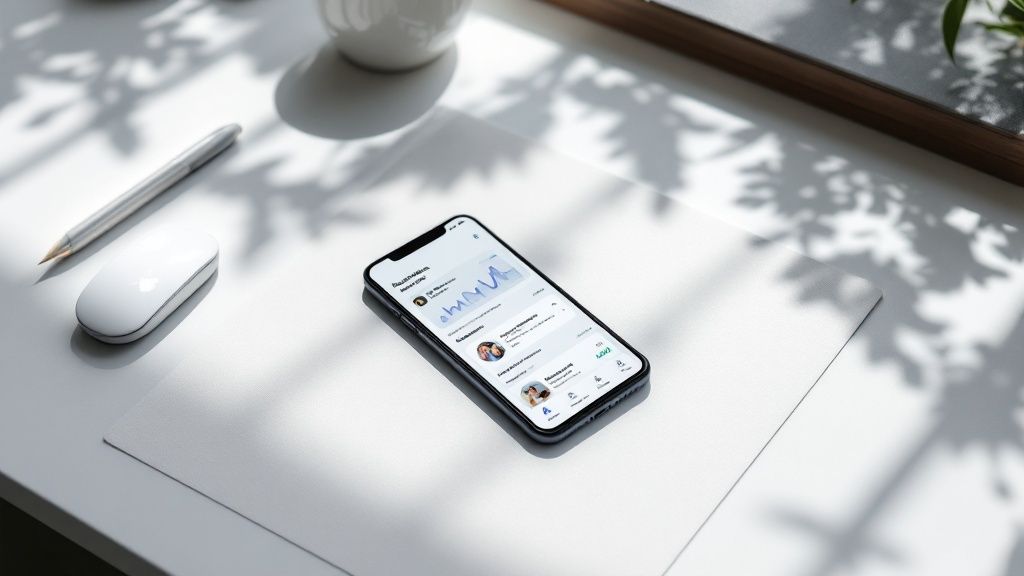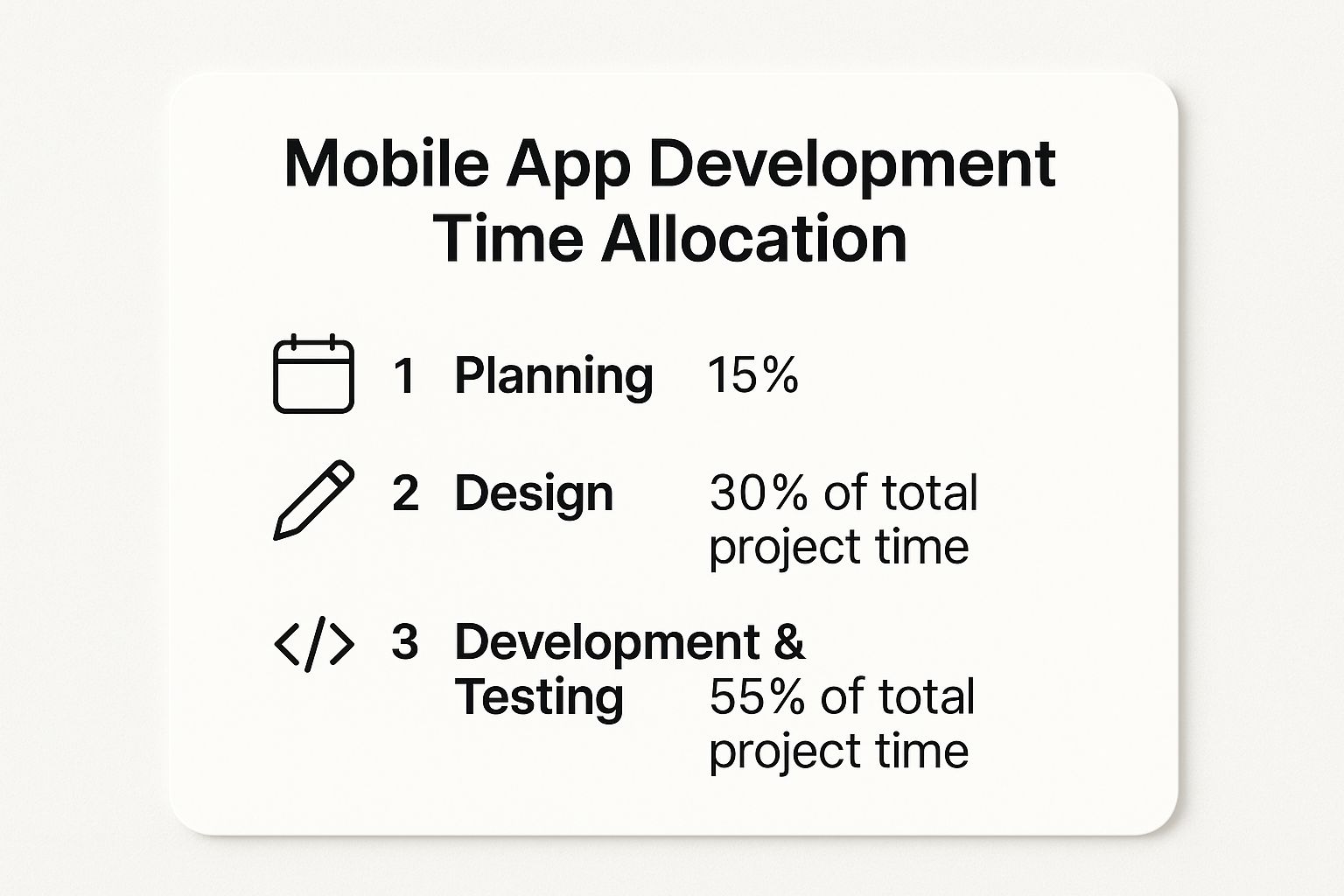Finding the right mobile app development company is about so much more than just hiring coders. You're looking for a strategic partner who can help you navigate the journey from a raw idea to a polished, successful product. And believe me, the most critical work you'll do happens long before you even start looking. A well-defined plan isn't just a nice-to-have; it's the foundation of a successful app and the secret to a productive partnership.
Defining Your App Before You Start the Search

Jumping into conversations with development agencies without a clear blueprint is a classic mistake. It’s a recipe for wasted time, confusing conversations, and wildly inflated quotes. The founders who get this right approach this initial phase with real intention, methodically turning a vague idea into a concrete plan. This groundwork makes every conversation you have focused, efficient, and productive.
This isn't just a formality. The decisions you make here will directly shape your budget, your timeline, and the technology stack you’ll need. Think of your clear vision as a filter—it helps you instantly see which companies are a good fit and which ones just don't align with your project's scope.
Pinpoint Your Core Purpose and Audience
Before anyone even thinks about writing a line of code, you have to nail the answers to two fundamental questions: What problem does my app actually solve, and who am I solving it for? An app designed for busy, on-the-go professionals will have completely different user experience (UX) requirements than one built for casual gamers. It's a different world.
Defining your target audience informs everything that comes next, from the layout of the user interface to your entire marketing strategy. Take the time to create detailed user personas. Give them names, jobs, and goals. This simple exercise brings your audience to life and makes your decision-making ten times easier.
Map Out Your Minimum Viable Product
Your first launch shouldn't—and can't—include every single feature you've ever dreamed of. That's a surefire way to run out of money and time. Instead, the smart move is to focus on a Minimum Viable Product (MVP). The MVP is a lean, clean version of your app with just enough features to be genuinely useful to your first wave of users. They'll use it, and their feedback becomes your roadmap for what to build next.
Learning to prioritise these core features is a crucial skill. You need a solid strategy for capturing and organising all your ideas so you can identify what truly matters for launch. To get this right, you can learn more about the various requirements gathering techniques in our detailed guide. This disciplined approach keeps your initial costs down and, most importantly, gets your product to market so much faster.
A well-defined MVP is your best defence against "feature creep." This is a common pitfall where a constant stream of new ideas derails timelines and bloats budgets. It forces you to focus on delivering real, tangible value from day one.
Choose the Right Technology Path
The technical path you choose will be one of the most significant decisions you make, with a direct line to your budget and the app's performance. There’s no single "best" option; each comes with its own set of trade-offs you need to understand.
Here’s a quick breakdown:
- Native Apps: These are built specifically for one operating system, either iOS or Android. They offer the absolute best performance, the slickest user experience, and the tightest integration with the device's hardware.
- Hybrid Apps: You code it once, and it runs on multiple platforms. This can be a huge time and money saver upfront, but you often have to accept some compromises on performance and the overall user feel.
- Web Apps: These are essentially mobile-friendly websites that look and feel like an app. You access them through a browser, so there's no need to download anything from an app store.
Knowing the difference between these is vital. When you start talking to a potential mobile app development company, being able to articulate your technical preferences sets clear expectations and shows you’ve done your homework.
How to Evaluate a Company's Real-World Experience

Alright, you’ve got a solid plan for your app. Now comes the hard part: vetting potential partners. A company's portfolio is your first real look into what they can do, but you need to know how to read between the lines. It's easy to get wowed by pretty designs, but your investigation has to go deeper.
You're hunting for proof that they're genuine problem-solvers. A portfolio should do more than just flash a few screenshots; it needs to tell a story. The best ones will lay out a clear business problem, walk you through the solution they built, and—most importantly—show you the results.
Go Beyond Surface-Level Portfolios
Don't just give their case studies a quick glance. You need to dig in and start asking the tough questions about their previous projects. Look for work in your industry, because that tells you they already get the unique hurdles and user expectations in your market.
Think about it: an agency that's already built a successful e-commerce app will have payment gateway integrations and inventory management down to a science. That kind of prior experience massively cuts down the learning curve and lowers your project risk.
When you’re digging through their past work, keep these things in mind:
- Business Impact: Did the app actually move the needle? Look for hard numbers. Did it boost user engagement, drive sales, or make operations more efficient for their client? You want to see specific metrics and KPIs.
- Problem-Solving: Does the case study explain the why behind the features? It should clearly define a user problem and show exactly how the app solved it.
- Industry Relevance: Have they worked with businesses like yours? Having experience in your sector is a huge plus.
Assess Their Technical Expertise and Processes
A beautiful app that crashes all the time is completely useless. This is where you have to vet the technical chops of a potential mobile app developement company. How proficient they are with certain technologies and their development process are huge clues about the quality you can expect.
You don't need to be a developer yourself, but you should get a feel for their core skills. Do they focus on native development with Swift (for iOS) and Kotlin (for Android)? Or are they more into cross-platform frameworks like React Native or Flutter? Every approach has its pros and cons, and their expertise has to line up with what your project needs. Getting a basic grip on the architecture of a mobile app can give you a great starting point for these conversations.
A truly skilled development partner will have a transparent and collaborative process. Look for mentions of agile methodologies like Scrum, which involve regular check-ins and iterative development. This approach allows for flexibility and ensures you’re involved at every stage.
Finally, a critical piece of their technical skill is making sure your app works perfectly for everyone. When you're looking at a company's technical side, see how they talk about supporting various mobile devices. This is key for ensuring broad compatibility and a consistent user experience across different screen sizes and OS versions. A great partner plans for this from day one.
Why India Is a Hub for App Development Talent

As you start looking for the perfect app development partner, you’ll probably notice a pattern: a lot of the heavy hitters are based in India. That’s no accident. Over the last decade, the country has really cemented its reputation as a global powerhouse for tech services, especially in mobile app development.
Working with an Indian mobile app developement company can give you a serious edge, but you need to understand what makes the market tick. The digital scene there isn't just growing; it’s exploding. This is thanks to government programs like 'Digital India' and some of the cheapest mobile data on the planet, creating a huge, tech-savvy population and a deep well of skilled developers.
A Mobile-First Market Breeds Expertise
Developers in India aren't just coding in a bubble. They’re building solutions for one of the most demanding mobile-first economies in the world. This domestic market, with its hundreds of millions of smartphone users, acts as a live-fire testing ground for creating apps that are scalable, reliable, and genuinely user-friendly.
This real-world, competitive experience gives Indian firms a practical advantage you won't find just anywhere. They’ve built up deep expertise in sectors that live and die by mobile tech, including:
- Fintech: Building everything from secure payment gateways to full-blown digital banking apps.
- E-commerce: Creating complex online storefronts with sophisticated inventory management systems.
- Health-tech: Developing platforms for telemedicine and managing digital health records.
This kind of background means they know how to build apps that can handle massive user loads and work flawlessly across dodgy network conditions—skills that translate directly to any global audience.
Choosing a company from a mature mobile market means you're not just hiring coders. You are partnering with a team that has firsthand experience navigating the challenges of user acquisition, engagement, and scalability in a highly competitive environment.
The Economic and Talent Advantage
The sheer size of India's talent pool is a huge part of the equation. With a massive number of engineering graduates joining the workforce every year, there’s a rich supply of skilled developers, designers, and project managers. This abundance of talent naturally leads to more competitive pricing, letting both startups and established companies stretch their development budget further.
This cost-effectiveness is amplified by the country’s incredible market growth. The Indian mobile app industry has expanded at a dizzying pace, pushed by widespread smartphone use and low-cost internet. As of 2024, India is one of the fastest-growing mobile app markets on the globe, with projections showing a compound annual growth rate (CAGR) of 17.8% from 2025 to 2030.
To really dig into how you can tap into global talent pools like India's, check out this ultimate guide to offshore mobile application development. It offers a fantastic framework for making smart outsourcing decisions.
Vetting Communication and Project Management
You could hire the most technically brilliant developers on the planet, but if they’re trapped behind a wall of poor communication, your project is doomed. A fantastic app idea can quickly unravel due to missed deadlines, misunderstood requirements, and a frustrating lack of transparency.
Think of your first few conversations with a potential mobile app development company as a direct preview of your future working relationship. Pay close attention to how they operate. Are they responsive? Do they ask clear, insightful questions? The way they handle these initial chats speaks volumes about what you can expect down the road. You’re not just hiring a vendor to tick off tasks; you’re looking for a true partner who will collaborate, communicate, and guide you.
Evaluating Their Workflow and Tools
You need to get a clear picture of exactly how they work. Vague promises of "regular updates" just won’t cut it. Ask them to walk you through their project management process, from the first kickoff meeting all the way to launch day. A professional agency will have a well-defined workflow they can explain without hesitation.
Dig into the specifics with questions like these:
- What project management methodology do you use? Most top-tier firms have adopted Agile frameworks like Scrum or Kanban. These approaches prioritise flexibility and allow for frequent feedback, which is exactly what you want.
- Which communication tools are central to your workflow? You should hear them mention industry-standard platforms. Look for familiarity with tools like Jira for managing tasks, Slack for daily chats, and Confluence for documentation.
- How do you handle scope changes or unexpected challenges? This question reveals their adaptability. A great partner won’t panic. Instead, they’ll have a structured process for evaluating changes, discussing the impact on your timeline and budget, and getting your approval before moving forward.
A team's project management style is a direct reflection of their company culture. An organised, transparent, and communicative process from day one almost always leads to a smoother project and a much better final product.
The infographic below shows how project time is typically allocated, which really highlights why having a clear handle on each phase is so critical.

As you can see, development and testing eat up the biggest slice of the timeline. This makes efficient management and crystal-clear communication during these phases absolutely essential for keeping everything on track.
Setting Expectations for Updates and Milestones
Your partnership should never feel like a black box where you throw in requirements and just hope for the best. A reliable mobile app development company will establish a predictable rhythm for updates and progress reports. This isn't about micromanaging them; it's about staying aligned and making sure there are no nasty surprises.
Before you sign any contracts, get absolute clarity on their reporting structure. Will you get a dedicated project manager? How often will you have formal check-in meetings—daily stand-ups, weekly summaries? Will they give you access to their project management board to see real-time progress? Their willingness to offer this level of transparency is a massive green flag. It signals a genuine commitment to an open and collaborative partnership.
To make this evaluation process easier, use a simple checklist to compare your shortlisted companies side-by-side. It helps you move beyond a gut feeling and make a data-driven decision.
Mobile App Development Company Vetting Checklist
| Vetting Criteria | Company A | Company B | Company C |
|---|---|---|---|
| Project Management Tool (e.g., Jira, Trello) | |||
| Communication Platform (e.g., Slack, Teams) | |||
| Dedicated Project Manager Assigned? | |||
| Frequency of Formal Meetings | |||
| Client Access to Project Board? | |||
| Process for Handling Scope Changes | |||
| Clarity of Initial Questions | |||
| Responsiveness (Initial Contact) |
By filling this out for each contender, you'll quickly see which company’s process and communication style is the best fit for you and your project. This simple step can save you from major headaches later on.
Navigating Contracts and Post-Launch Support
You’ve found a potential partner who seems to tick all the boxes. They’ve got the experience, the technical chops, and the communication feels right. Now it’s time to make it official.
This final stage is all about getting the legal details ironed out and making sure your app is set up for success long after it hits the app stores.
Choosing the Right Engagement Model
The way you structure the project financially—the engagement model—directly impacts your budget and how flexible you can be down the road. Getting this right from the start prevents a world of headaches and ensures the financial side of things aligns with your project’s actual needs.
There’s no one-size-fits-all answer here; the best choice really depends on how clearly your scope is defined. A good mobile app developement company won't just push one option; they'll help you figure out what makes the most sense.
Here’s a quick rundown of the usual suspects:
- Fixed Price: This is perfect for projects where you know exactly what you need, down to the last detail. You agree on one set price for the whole project upfront. It's great for predictable budgeting, but leaves very little room for changes once the work starts.
- Time & Material (T&M): If your project is more fluid or you expect things to evolve, T&M is your friend. You pay for the actual hours and resources the team puts in. This gives you maximum flexibility, but you’ll need to keep a close eye on progress to manage the budget.
- Dedicated Team: For big, long-term projects, this model gives you a full-time crew that acts like an extension of your own company. It offers deep integration and commitment, making it ideal for complex apps that need continuous development.
Key Clauses to Look for in Your Contract
Your contract is your project’s safety net. Don't just skim it—read every single line. A few non-negotiable clauses absolutely must be in there to protect your business and your intellectual property.
A well-drafted contract isn’t just legal jargon; it’s a sign of a professional and transparent partner. It should lay out expectations, deliverables, and responsibilities so clearly that there’s no room for misunderstandings later.
Pay extra attention to these critical areas:
- Intellectual Property (IP) Rights: The contract must state, in no uncertain terms, that you own 100% of the source code, designs, and all related IP once the final payment is made.
- Non-Disclosure Agreement (NDA): This is a legally binding clause that keeps your app idea and sensitive business data under wraps.
- Payment Schedule: The contract should clearly detail the payment milestones, spelling out exactly how much is due and at what stage of the project.
For example, many businesses find cost-effective development options in regions like India, which is especially appealing for startups. The country's growing digital infrastructure supports a massive mobile user base. To give you an idea of the market potential, revenue from India’s OTT video streaming sector alone is projected to hit $476.6 billion by 2027, highlighting the massive opportunity for content-driven apps. You can dive deeper into a complete breakdown of mobile app development costs on shyamfuture.com.
Planning for Life After Launch
The job isn’t done when your app goes live. Not even close. A successful app needs ongoing care to fix bugs, adapt to new operating systems, and stay secure.
Before you sign anything, ask detailed questions about their post-launch support and maintenance plans. A solid plan for what happens after launch is just as important as the initial build. Our detailed mobile app testing checklist can give you a good sense of what's involved. This kind of foresight ensures your investment stays functional, secure, and valuable to your users for years to come.
The Big Questions to Ask Before You Hire Anyone
Even after you've done your homework and shortlisted a few potential partners, there are always a few big questions that need answering before you can confidently sign on the dotted line. This isn't about second-guessing your choice; it's about making sure everyone is completely aligned before the real work begins.
Let's cut through the noise and tackle these critical questions head-on.
So, How Much is This App Actually Going to Cost?
This is almost always the first thing people ask, and the only honest answer is: it depends. The final price tag for an app swings wildly based on how complex it is, the number of features you need, and whether you're building for iOS, Android, or both.
It helps to think of it like building a house. A simple one-bedroom cottage and a sprawling mansion with a pool are both houses, but they come with very different costs. App development works the same way.
- A simple app with just the core features might land somewhere in the ₹10,00,000 to ₹30,00,000 range.
- A moderately complex app that needs to connect with other systems (using APIs) and has a custom-designed interface could be anywhere from ₹30,00,000 to ₹75,00,000.
- A highly complex app with a heavy-duty backend, real-time features, and multiple third-party integrations can easily shoot past ₹1,00,00,000.
The key here is to push for a detailed, itemised quote that’s based on the specific feature list for your MVP. If a company throws out a price without truly understanding what you want to build, that’s a massive red flag.
Who Owns the Code When the Project is Finished?
The answer to this should be simple, clear, and non-negotiable: you do.
Your contract needs to state in no uncertain terms that once the final payment is made, you get 100% ownership of everything—the source code, the design files, and all the intellectual property (IP).
There’s no grey area here. Be very cautious of any mobile app development company that tries to pitch you a licensing deal or gets fuzzy on the details of the IP transfer. Owning your code is what gives you the freedom to take your app to another developer down the road and truly control your product's future.
A professional partner will treat IP ownership as a standard, no-brainer part of the deal. If they hesitate or try to complicate this, it’s a clear signal to walk away. Protect your idea and your investment by making sure this clause is rock-solid in the contract.
What Happens After the App Goes Live?
Launching your app isn’t the end of the journey—it’s the start of the race. A great app needs ongoing care to stay competitive and functional. Any agency worth its salt knows this and will offer post-launch support and maintenance plans to make sure your app doesn't fall behind.
This kind of ongoing support usually covers the essentials:
- Bug Fixes: Stamping out any glitches that appear once real users start interacting with the app.
- OS Updates: Making sure your app doesn't break when Apple and Google release new versions of iOS and Android.
- Security Patches: Protecting your app and your users' data from new vulnerabilities.
- Server Monitoring: Keeping an eye on the backend infrastructure to ensure everything is running smoothly.
You should have this conversation before you sign the initial contract. The app market is moving incredibly fast. Global consumer spending hit a staggering $40 billion in the first quarter of 2025 alone, and Indian consumers are a huge part of that growth, with national smartphone penetration now topping 50%.
On top of that, AI-powered apps are seeing a massive 112% year-over-year expansion, a space where Indian firms are becoming major players. A solid support plan from your chosen mobile app development company is what ensures you can compete effectively. You can dig into more mobile app statistics on itransition.com to see just how fast things are changing.
At KP Infotech, we don't just build apps; we build lasting partnerships. From the initial strategy sessions to long-term post-launch support, we offer the end-to-end expertise you need to turn your vision into a market-ready success. Discover how our team can help you grow at https://kpinfo.tech.
